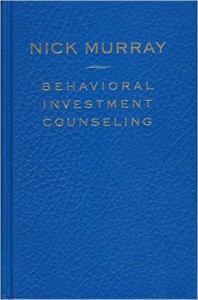Murray is the author of one of my favorite investing books of all time, Simple Wealth Inevitable Wealth, and I’m reviewing this later book partly as an excuse to call attention to his earlier book, SWIW.
But Behavioral Investment Counseling by Nick Murray stands on its own quite well.
The book’s bedrock idea – captured right there in the title – is that investor behavior determines an individual’s wealth prospects, rather than “markets.”
Now this strikes me as 100%, Capital T, True, although an uncomfortable truth for many.
Ask me “how are the markets doing?“ and the right answer – as I’m certain Murray would agree – is “Doesn’t matter, how’s your behavior doing?”
Since Murray’s audience for this book is not individual investors but rather investment advisors, the logical lesson is that advisors need to focus on the beliefs and behaviors of their clients, rather than spend much time on asset or manager selection.
I’ve never wanted to be an investment advisor, but the way Murray describes the “behavior investment counselor” makes the profession seem especially noble.
I dig his voice. He’s a wise and slightly weary zen master who has seen all of the investment behavior mistakes possible, and can describe them to you before you even make them.
 On many an important point he acknowledges the unknowability or unprovability of his point. Nevertheless, not doing what he says – not intuiting the essential wisdom – leads to grievous error. You’re welcome to persist in your own stubborn views, he seems to say, and best of luck to you.
On many an important point he acknowledges the unknowability or unprovability of his point. Nevertheless, not doing what he says – not intuiting the essential wisdom – leads to grievous error. You’re welcome to persist in your own stubborn views, he seems to say, and best of luck to you.
I’m not as old as Murray but I find myself adopting that same attitude at times. I mean, people enjoy their investment fantasies. Who am I to disillusion them?
In my own words, the message of the book is
- The entire value of an investment advisor is captured in the making of a plan taking into account the client’s specific situation – and then the occasional behavioral counseling at key moments (mostly when the market crashes, but also possibly when it is on a tear upwards and there’s a need to rebalance back to the original plan.)
- Readers of SWIW will not be surprised to learn that the best plans will rely heavily on diversified equities (rather than fixed income) as this is the only way to grow one’s money, and avoid the most important risks – loss of purchasing power and outliving one’s money.
For actual investment advisors, Murray’s book offers what seems to me a tremendous amount of self-evident wisdom about what an advisor does, how an advisor should go about building a practice, and how an advisor should first ‘pitch’ prospective clients.
If you haven’t read any Nick Murray yet, do yourself a favor…
Please see related reviews:
Simple Wealth Inevitable Wealth by Nick Murray
The Game of Numbers by Nick Murray
Post read (2008) times.




